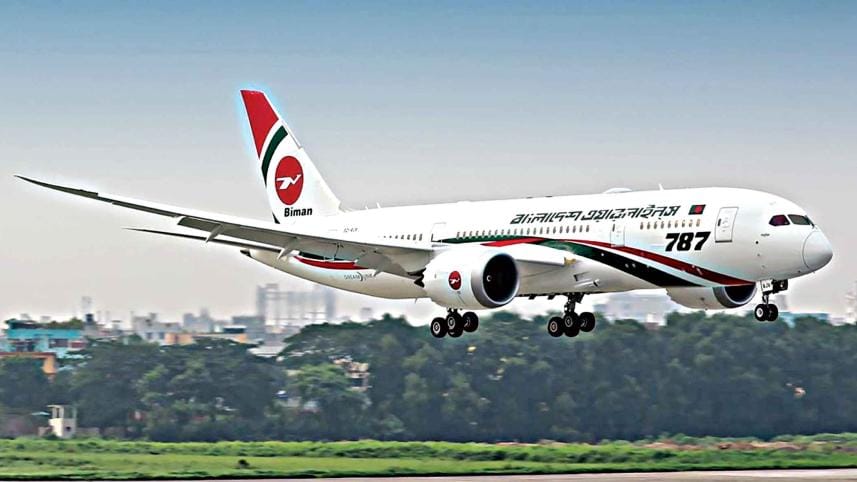Biman 787 suffers glitch on return flight from Tokyo

The weather radar system on the Biman aircraft that Prime Minister Sheikh Hasina used to fly to Tokyo broke down on the return flight to Dhaka.
The aircraft, a Boeing 787 that joined Biman's fleet in 2018, dropped off the PM at Tokyo International Airport (Haneda) on the morning of April 25, refuelled, and departed for Dhaka an hour and 45 minutes later.
During the return leg, the pilot noticed that neither of the two weather radar systems were working.
Deprived of a functioning weather radar, the pilot had to navigate the plane through the pitch-black darkness of the evening sky before safely touching down at Hazrat Shahjalal International Airport at 11:17pm.
The pilot-in-command, Captain Ishtiaque Hossain, after landing in Dhaka filed a technical log, which The Daily Star obtained a copy of.
The technical log states that "Both WXR [weather radar] systems return unreliable, both WXR systems test shows "WXR fail drv [drive]" with "WXR SYS [system]" advisory message and unusual sound from WXR antenna".
The log also includes notes about what rectification measures had to be taken after landing.
"Antenna drive unit replaced," it said.
The thorough security check that all VVIP flights are subject to prior to flying did not pick up the impending motor failure.
The checks, which is conducted by Biman engineers in the presence of every single intelligence agency, and the Special Security Force, can last up to three days.
The radar system detects weather up to 50 nautical miles ahead of the aircraft, based on which pilots can make directional decisions.
"An aircraft can operate without a weather radar system. The pilot can communicate with the ground and get weather updates. There was a time when planes did not have weather radars," said Air Commodore Md Moazzem Hossain, director of engineering and material management at Biman Bangladesh Airlines.
However, over the last 50 years at least, all commercial aircraft come equipped with weather radar systems because ground radar systems can only give weather updates within their range, not for the whole flight, said Biman insiders.
An aircraft being forced to fly without a functioning weather radar system is said to be flying on a "minimum equipment list".
On April 19, a Riyadh-bound Biman flight was forced to return to Dhaka airport as the aircraft's weather radar system was not working. The plane was in the air for two and a half hours on a "minimum equipment list".
However, a VVIP flight cannot operate on a "minimum equipment list", according to the "red book", a rulebook on the security protocol for the prime minister.
Air Commodore Hossain called it a "small problem" that did not "pose a safety hazard".
According to the VVIP flight handling manual by CAAB, the aircraft selected for flying the PM must be grounded for checks and inspections for at least 22 hours before departure, in the case of models like the Boeing 787.
The manual states that the engineers used for checking the aircraft must be pre-selected by the head of the engineering department and handed over to the government's security agencies 48 hours before the departure.
The engineers' names, the specific duties of each, and which part of the plane they will be looking into are listed.
"All equipment taken in/out of the cordoned-off area must be checked at piece level. Any part needed to be replaced must be endorsed in the register mentioning the name of the part with proper specification/part number, the individual carrying the part along with his or her signature," says the manual.
A 10-member committee, led by the general manager of central control, oversees the planning and execution of the flight.
"The plane is inspected by our engineers and taken for two ground runs before taking to the air," said Air Commodore Hossain.
He denied the prospect of any negligence. "Even if this problem had happened while the prime minister was in the air, this would not have been negligence. This is an equipment, and anything can happen anytime."
Captain Siddiqur Rahman, Biman's director of flight operations, also denied any possibility of negligence.





 For all latest news, follow The Daily Star's Google News channel.
For all latest news, follow The Daily Star's Google News channel.
Comments